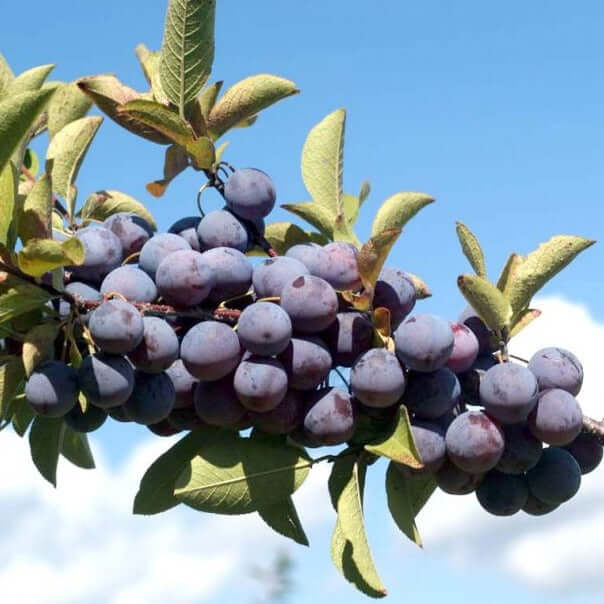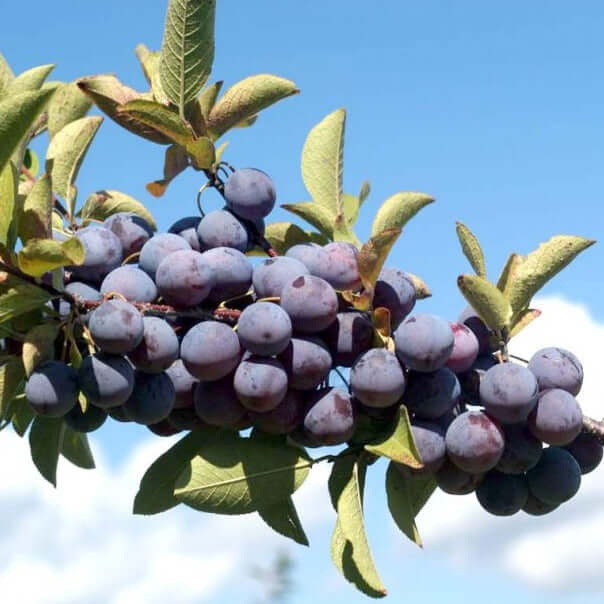Beach Plum
Beach Plum
Every tree🌳 is dipped in mycorrhizae for a strong start!
Sorry, it's out of stock.
But we can let you know when it's back in.
- Fully secure checkout
- Trusted by thousands
- Rated and reviewed
Specifications
Specifications
|
Zones |
3-8 |
|---|---|
|
Soil Types |
Sandy |
|
Soil Conditions |
Well Drained |
|
Growth Rates |
Fast |
|
Maturity Height |
6-12' |
|
Production Starts |
August, September, October |
|
Harvest Details |
August - September |
|
Crop Abundance |
Thick Clusters |
|
Specializations |
Thicket, Bedding, Screening |
Full Description
🍇 Beech Plum Shrub (Prunus maritima)
Zones: 3–8 | Height: 4–8 ft | Spread:** 6–10 ft | Growth Rate: Medium
Light: Full sun | Soil: Well-drained, sandy to loamy
Fruit Ripening Time: August to September
Pollination: Plant 2+ for best fruit set
🏞️ Product Description:
The Beech Plum is a hardy, native fruiting shrub that delivers dense cover and wildlife-attracting fruit—perfect for food plots, field edges, and upland habitat improvement. This coastal-native plant thrives in well-drained soils and produces sweet, tart plums from late summer into fall, making it a valuable soft mast addition to any hunting or habitat property.
With its compact size and suckering habit, Beech Plum forms thickets ideal for cover and nesting, while feeding everything from deer and turkeys to songbirds and small game.
🦌 Perfect for Hunting Properties:
This shrub pulls double duty as a food source and habitat booster:
🍽️ Soft Mast from Summer into Fall:
Beech Plum fruits ripen from August through October, giving wildlife access to sweet, energy-rich food right as seasons begin to change. Great for filling the gap between early persimmons and hard mast drops.
🌾 Cover That Produces:
Grows thick and low, offering excellent bedding, nesting, and escape cover—especially when planted along edges, trails, or as part of a wildlife corridor.
🦃 Upland Bird & Pollinator Friendly:
Its spring blooms attract native pollinators and butterflies, while its fruit and structure support turkeys, quail, and songbirds throughout the year.
🌱 Tough, Native & Low Maintenance:
Adapted to sandy, dry soils and salt-tolerant by nature, Beech Plum is extremely hardy and requires minimal care once established. It thrives in poor or disturbed sites, and spreads over time to form dense habitat blocks.
💡 Pollination Note:
Beech Plum is not reliably self-pollinating, so plant at least two or more shrubs to ensure a good fruit crop.
🛠️ Planting Tips:
-
Space 5–8 ft apart to form dense cover or productive hedgerows
-
Use Shrub Survival Kits to boost establishment and protect young plants
-
Prune lightly to encourage branching and rejuvenate old growth
-
Mulch first season to retain soil moisture and reduce weed pressure
🐾 Summary:
The Beech Plum is a compact powerhouse for wildlife habitat—offering fruit, cover, and ecological value in one rugged native plant. Whether you're designing thickets for game birds or adding soft mast to your food plot plan, this shrub brings season-long benefits and thrives where others won’t.
Plant it for fruit, cover, and the kind of native diversity that supports wildlife all year long.

Don't take our word for it...
-
Healthy Trees, On Time!
I placed my first order couple months ago. Everything came on time, order was right, and trees healthy. Everything has leafed out and growing great! Had such a good experience that I placed a second order. Can't wait for it to arrive!
Luke L. -
Oak Orchard
I purchased 35 hybrid oak trees from Morse in 2005 and a majority of them are still alive and have been producing acorns for years. One is even big enough to hunt from. I planted them with tree tubes and watered them regularly for the first two years. It has been a pleasure watching them grow.
Pat K. -
Great customer service!
I highly recommend Morse Nursery! My trees arrived 100% healthy. I was really impressed by the height of the trees. I expected little trees like I’ve gotten from other nursery’s. Will keep buying from you guys. Great customer service too.
IsaacDirector, Company name

